Women Battle Sanitary Crisis After Maiduguri Flood Displaced Them
Crammed into overcrowded rooms with limited access to sanitary supplies, women and girls displaced by the devastating Maiduguri floods face heightened risks of health complications.
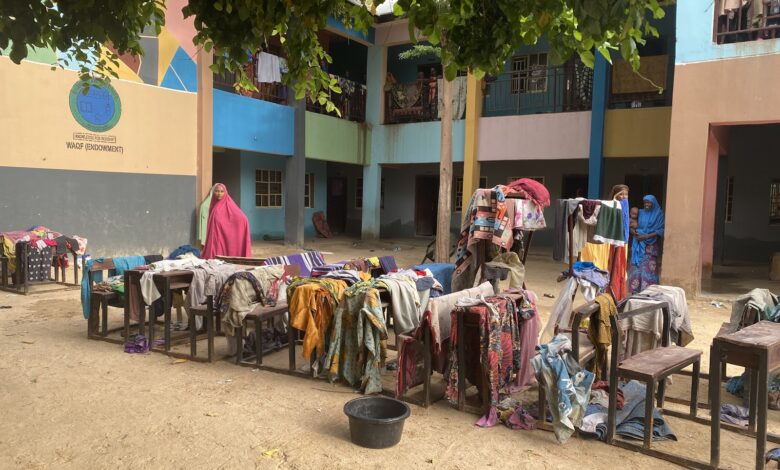
Walking through the well-constructed compound of Al-Habib Islamic Institute, now repurposed as a shelter for flood victims from Dikwa Low-Cost Area in Maiduguri, Northeast Nigeria, it would be easy to assume that all basic needs are being met. Yet, the reality of the women and girls living there tells a far different story. A pressing shortage of sanitary pads and hygiene products has sparked a silent crisis among the displaced.
For weeks now, the central parts of Maiduguri, the Borno state capital, have been submerged, displacing thousands and claiming lives as residents fled their waterlogged homes.
In its bid to provide shelter for residents displaced by the floods, the state government reopened some Internally Displaced Persons (IDP) camps in the state. Humanitarian agencies, including the Norwegian Refugee Council, have described the situation as dire, worsening the conditions of those already struggling.
While the affected residents are adjusting to their new lives in the camps, many women and girls are battling with poor sanitary conditions.
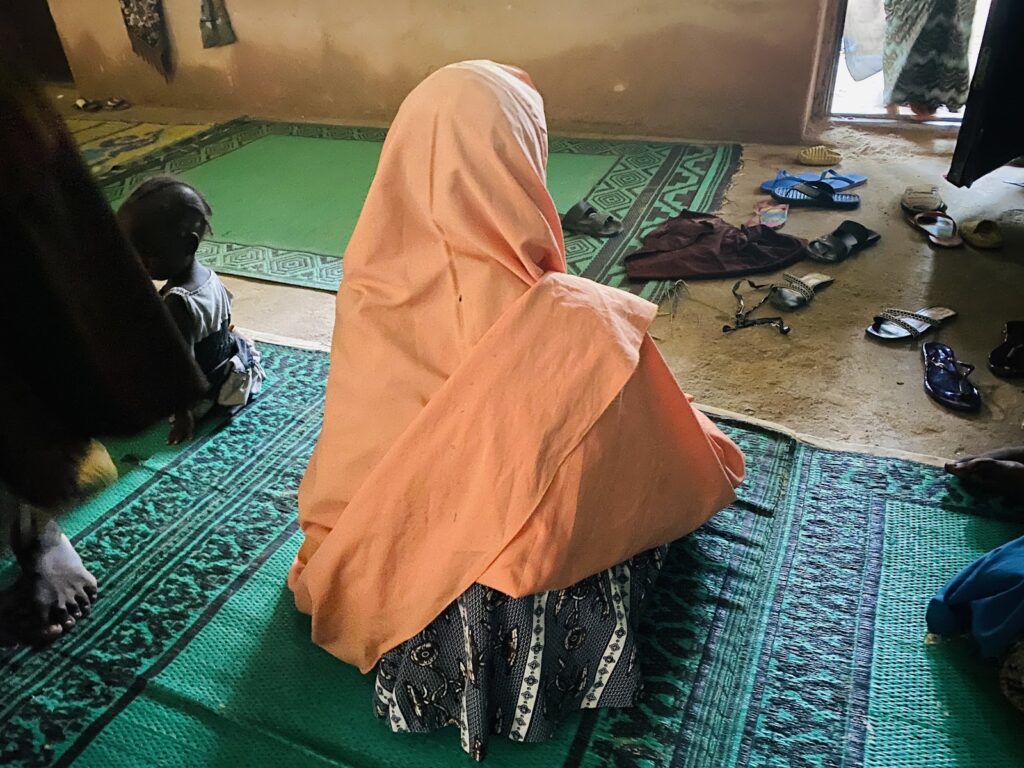
Rukaiya Musa, a 40-year-old mother of five, vividly recalls when the disaster struck. Struggling with malaria at the time, she could barely stand when the floodwaters surged into her home. Her children had to carry her to safety, eventually ending up at the overcrowded school premises where dozens of families had taken refuge.
But her troubles were far from over.
“After just one day here, I started my period,” Rukaiya told HumAngle, her voice trembling. “I had no pad, no underwear, nothing. I felt helpless. A friend gave me a piece of cloth, and that’s what I had to use.”
With no sanitary pads in sight, Rukaiya tore the cloth into smaller pieces to manage her cycle. She also borrowed underwear from another woman. But even with these makeshift solutions, her fear of contracting an infection grew as she faced the challenge of using the shelter’s poorly maintained toilets.
“I tried to clean them [the toilets] with detergent and water, but sometimes, all we had was water. We need hygiene essentials like soap, pads, detergent, and clean underwear. So many women here are suffering,” she lamented.
Although Rukaiya and the other women have been separated from the men in the shelter for safety and privacy, this slight relief does little to lessen their suffering.
“We don’t have to share toilets with the men, but that doesn’t make things better,” she explained. “Our area has dried up a little, but the houses and toilets are ruined. We need urgent government intervention.”
Elizabeth Musa, a social worker with Hope Alive Care in Borno, described the situation in the camps as ‘extremely unhygienic.’
Having visited the camps to provide relief materials with her organisation, Elizabeth told HumAngle that even though some organisations have given out hygiene kits and sanitary pads to most of the women and girls, over 50 per cent of the girls and women in the camp do not have access to proper sanitary hygiene.
Apart from receiving sanitary materials and kits as donations, Elizabeth believes that women need sensitisation on how to manage their health in such situations so that they don’t become prone to infections in the future.
A race against time
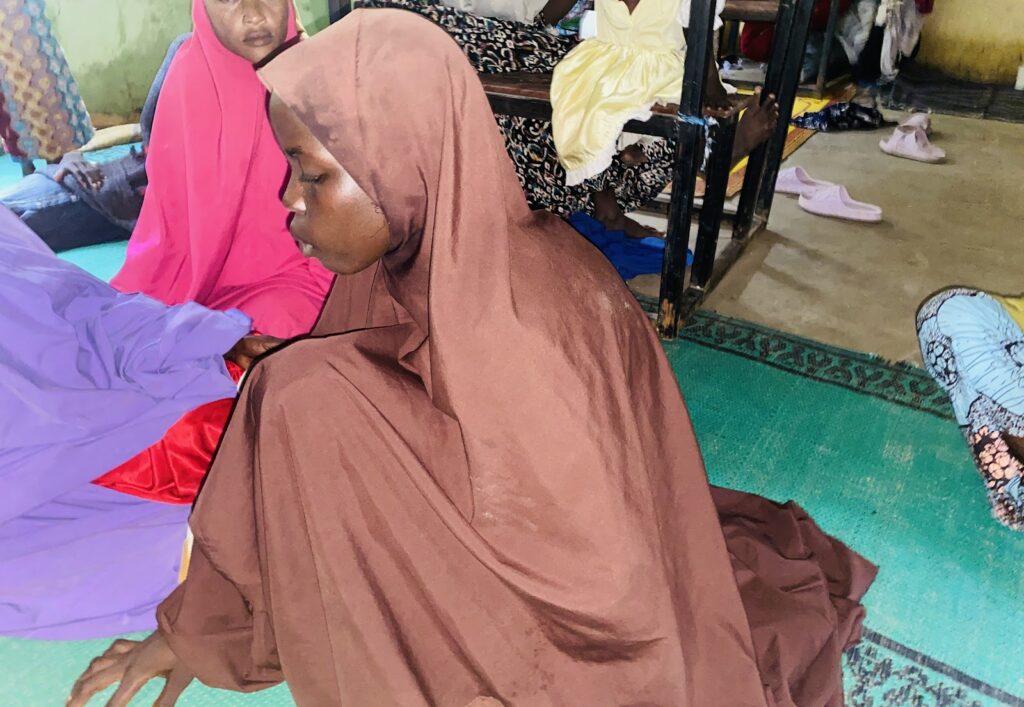
Nineteen-year-old Fatima Bukar, too, has her tale of desperation. When the flood forced her out of her home, she also found herself at the school premises, unprepared for the sanitary challenges ahead. She was on her period when the flood hit.
“I was worried about how I’d manage my period,” Fatima recounted. “I didn’t have pads; by the time I got here, I was already stained.”
Feeling the overwhelming frustration of having her basic needs unmet, Fatima managed to purchase sanitary pads from a small nearby shop with the help of a member of the Civilian Joint Task Force assigned to the camp.
“It was the most distressing experience. I never thought something so simple would become such a problem. No girl should ever have to go through this,” she said.
According to Elizabeth Musa, no steps have been taken by the government so far to address the sanitary challenges the displaced women are currently facing in the camps.
“Only a few organisations have done their best to provide sanitary kits for the women and girls, which is still not enough to cater to most of the girls in the camps,” she said.
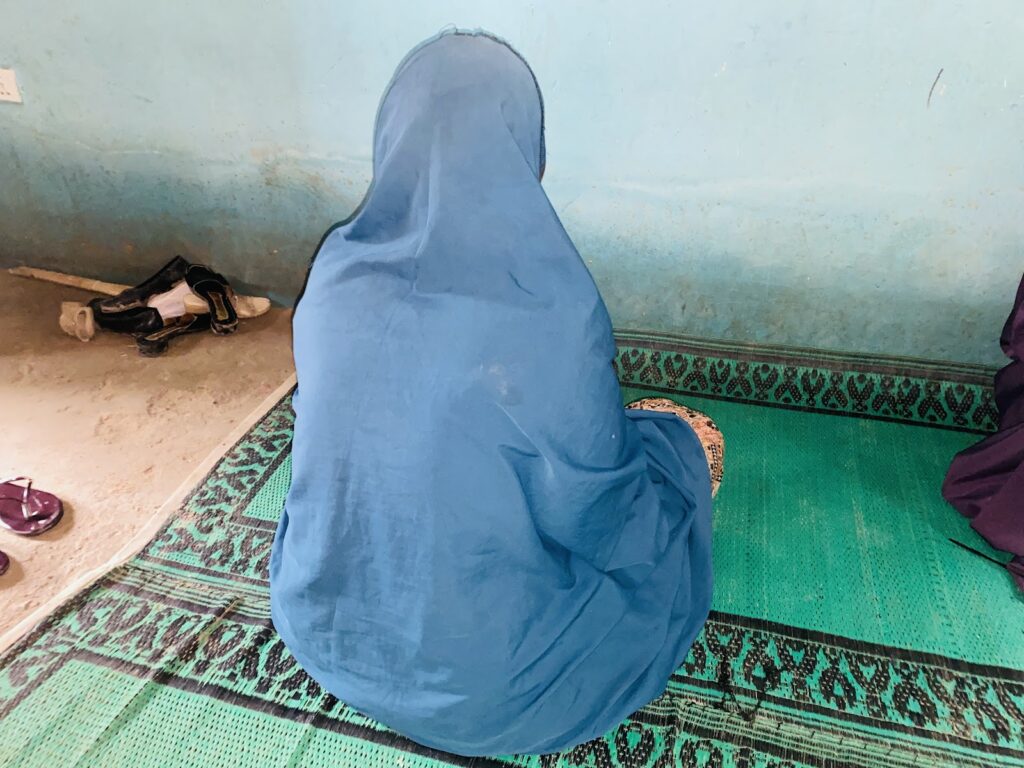
The strain of survival
For Falmata Grema, a 30-year-old mother of nine, life in the shelter has been a mixture of hardship and adaptability.
“I came here under very difficult circumstances, and honestly, I’m not even thinking of going back home because our house is completely destroyed,” she said.
Falmata has adjusted to the routines of shelter life, including wearing the same clothes daily and finding ways to stay clean. She regularly dry cleans her clothes and carefully washes her single pair of underwear, doing her best to maintain a sense of order amid the challenges.
She is also worried about her neighbour, who noticed a change in her menstrual flow since arriving at the camp. “She used to have a heavy flow, but now it’s so light that she doesn’t even need a pad. I think it’s the stress,” Falmata said. “My neighbour, who discussed this with me, is out checking her destroyed home; otherwise, she could have narrated it to you herself.”
Amidst the devastating sanitary conditions, another critical concern for Falmata is the lack of access to medical care. “We have no access to doctors or clinics. We are dealing with health issues, and there’s no one to help us. We need food and, more importantly, medical attention,” she cried out.
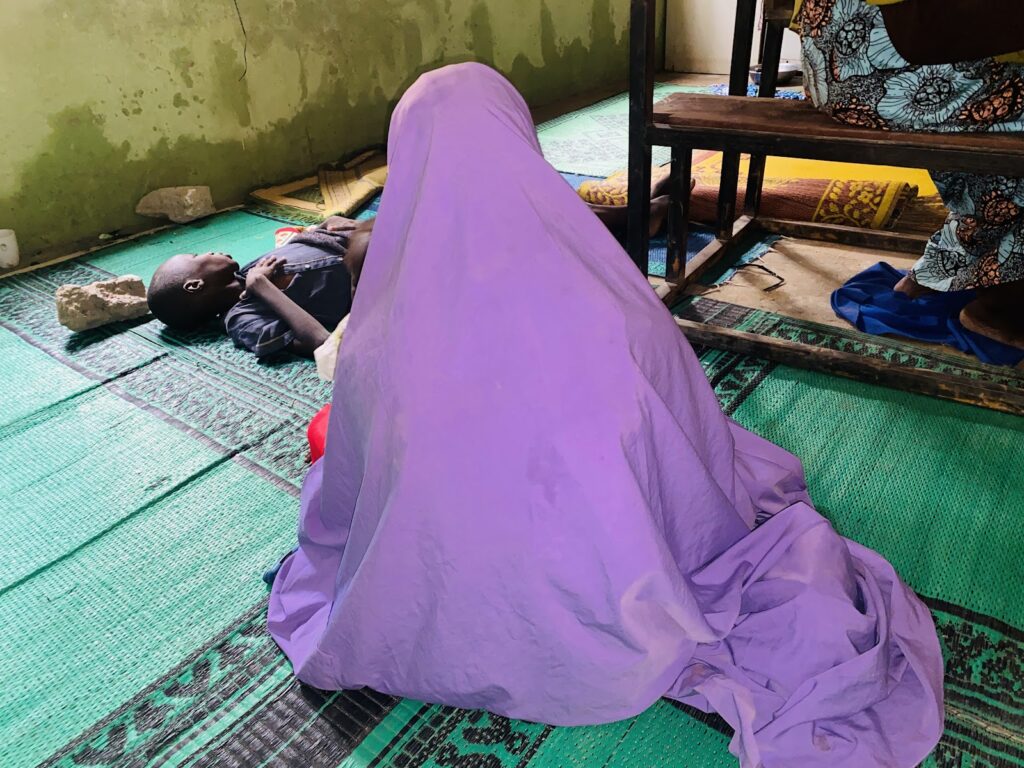
Fatima Mohammed, a 35-year-old mother, recalls the early days of life in the shelter.
“When I first arrived, I stayed on the first floor because the area downstairs was flooded. The place was clean at first, but as more people arrived, it became impossible to maintain,” she said.
Her experience with the shared toilets is challenging.
“I’ve seen blood in the toilets more than once. It’s uncomfortable, but I have no choice,” she said.
While access to water has improved, Fatima has difficulties managing her period.
“After just three days, I started my period and had nothing- no pads, no clean clothes, no underwear,” she stressed.
Fatima, like many others, received limited help from relief organisations. “Save the Children registered us, and they gave ready-to-use therapeutic food, popularly known as ‘Tamuwa,’ to malnourished children, but we need more help. People are getting sick here. Malaria, diarrhoea, and vomiting, and we are scared that it could be cholera.”
At the Bakassi camp, where other flood victims have taken refuge, women and girls face similar challenges, particularly in accessing sanitary pads.
One of the victims, Zara Ali, a woman from Kasuwan Shanu, shared her experience. She recounted how she was transported to the camp after being picked up by a rescue bus. Since her arrival, she has taken on the role of a leader in a room shared by 41 women.
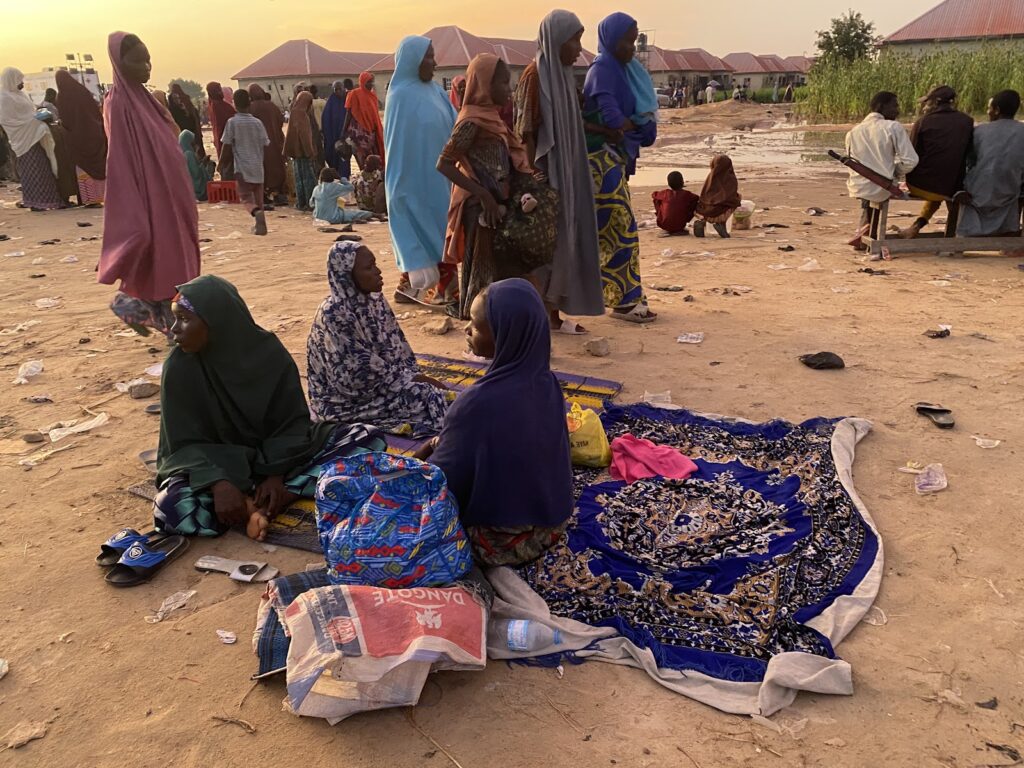
“Thankfully, my period had just ended when I arrived,” Zara said. “But even then, we had no water at first. I had to ask for help to clean myself.”
Like many others, Zara waited days before receiving basic sanitary supplies, thanks to a civil society. “On Sept. 17, we were given a pack of pads and one pair of underwear each by a relief organisation,” Zara said.
Though she has taken on the role of managing the shelter’s cleanliness, Zara expressed her concern about the ongoing challenges. “The women here need help, and there are too many of us with little supplies to go around.”
“There should be a call to action by the government to take hygiene and sanitary care for women and girls as a serious issue and provide necessary materials to ensure that these girls are safe during this period,” Elizabeth said.
HumAngle contacted Dr Mairo Mandara, special adviser to the Governor of Borno State on humanitarian support, via phone call and text messages for comments on government efforts toward improving the sanitary conditions of the women affected by the flood but received no response before publication.
Displaced women and girls in Maiduguri, Northeast Nigeria, are facing a severe hygiene crisis due to a lack of sanitary pads and hygiene products in temporary shelters following severe floods.
The floodwaters have submerged central Maiduguri, prompting the reopening of IDP camps by the state government, but the conditions remain dire.
Women in these shelters, like Rukaiya Musa and Fatima Bukar, struggle with managing their menstrual hygiene using makeshift solutions due to the scarcity of sanitary supplies, leading to fears of infections.
Social worker Elizabeth Musa highlights that more than half of the displaced women lack proper sanitary hygiene, despite some relief efforts.
The poor conditions and the absence of medical care heighten their struggles. There have been calls for urgent government intervention to address these critical needs, but no substantial measures have been taken so far.
Support Our Journalism
There are millions of ordinary people affected by conflict in Africa whose stories are missing in the mainstream media. HumAngle is determined to tell those challenging and under-reported stories, hoping that the people impacted by these conflicts will find the safety and security they deserve.
To ensure that we continue to provide public service coverage, we have a small favour to ask you. We want you to be part of our journalistic endeavour by contributing a token to us.
Your donation will further promote a robust, free, and independent media.
Donate HereStay Closer To The Stories That Matter




